US President Donald Trump has consoled victims of mass shootings in Ohio and Texas, but faced protesters demanding gun control and denouncing what they say is his extremist rhetoric on race and immigration.
Mr Trump first headed to Ohio city, which was the site of one of last weekend's two deadly mass shootings that shocked the country.
He was greeted at the airport by a bipartisan group of state and local officials, including Democratic Dayton Mayor Nan Whaley, who had said she would welcome Mr Trump but planned to tell him he had been "unhelpful" on the issue of gun violence.
Mr Trump visited survivors, first responders and staff at Miami Valley Hospital in Dayton, where nine people and the suspect were killed in a rampage early on Sunday.
The visit to Dayton came as critics accused him of inflaming tensions with anti-immigrant and racially charged rhetoric.
Dozens of protesters outside the hospital set up a "baby Trump" blimp balloon and held signs reading "Do Something," "Save our city," and "You are why".
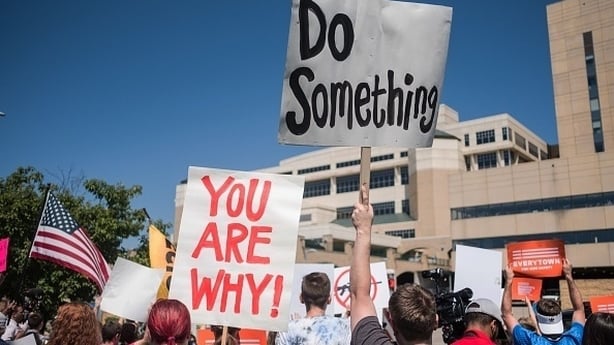
The president later landed in El Paso, Texas, where a self-declared white supremacist murdered 22 people last weekend at a Walmart heavily frequented by customers of Hispanic origin.
As a famed border city, El Paso is at the center of Donald Trump's high-profile political campaign against illegal immigration.
The killer deliberately sought out the city, claiming to be stopping an "invasion" of illegal migrants, a term that has been used repeatedly by the President as well.
Protesters gathered, just as they had at the President's earlier stop in Dayton. Even the city's Republican mayor offered only a grudging welcome, stressing icily that he would greet Mr Trump in his "official capacity".
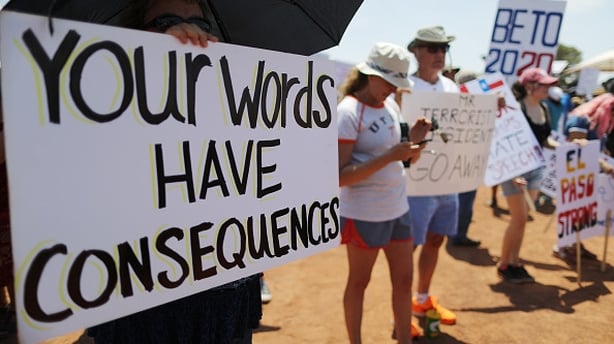
Local Democratic congresswoman Veronica Escobar said she would not meet the president. "From my perspective, he is not welcome here. He should not come here," Ms Escobar said on Tuesday on MSNBC.
While flying from Dayton to El Paso, President Trump tweeted from Air Force One that he was watching a televised speech by the frontrunner in the race for the Democratic presidential nomination, Joe Biden.
In the speech, Mr Biden accused Mr Trump of fanning "the flames of white supremacy."
"Watching Sleepy Joe Biden making a speech. Sooo Boring!" Trump commented.
Watching Sleepy Joe Biden making a speech. Sooo Boring! The LameStream Media will die in the ratings and clicks with this guy. It will be over for them, not to mention the fact that our Country will do poorly with him. It will be one big crash, but at least China will be happy!
— Donald J. Trump (@realDonaldTrump) August 7, 2019
The back-to-back massacres, occurring 13 hours apart, have reopened the national debate over gun safety and led protesters in Dayton to heckle Ohio's Republican governor, Mike DeWine, at a vigil for the shooting victims with chants of "Do something!"
As he left the White House, Mr Trump said he wanted to strengthen background checks for gun purchases and make sure mentally ill people did not carry guns.
He predicted congressional support for those two measures but not for banning assault rifles.
"I can tell you that there is no political appetite for that at this moment," Mr Trump told reporters at the White House.
"But I will certainly bring that up ... There is a great appetite, and I mean a very strong appetite, for background checks."
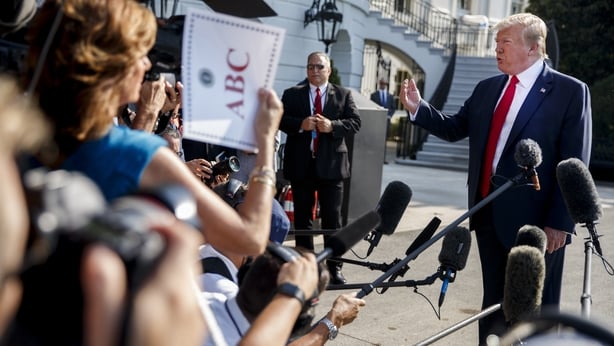
Read more:
Obama denounces leaders feeding 'climate of fear'
'Thoughts and prayers', but will anything change?
Critics have said Mr Trump stokes violence with racially incendiary rhetoric. The El Paso massacre is being investigated as a hate crime and the FBI said the Dayton shooter had explored violent ideologies.
On Monday, Mr Trump gave a speech focusing on mental health reforms, tighter internet regulation and wider use of the death penalty.
Democrats accuse Mr Trump of hiding behind talk of mental illness and the influence of social media rather than committing to laws they insist are needed to restrict gun ownership and the types of weapons that are legal.
"It's political season and the election is around the corner. They want to continue to push that racist narrative." @ainsleyearhardt @foxandfriends And I am the least racist person. Black, Hispanic and Asian Unemployment is the lowest (BEST) in the history of the United States!
— Donald J. Trump (@realDonaldTrump) August 6, 2019
In a sign of higher tensions after the shootings, a motorcycle backfiring last night in New York's Times Square sent crowds running for fear of another gun attack.
"People are obviously very frightened," New York Governor Andrew Cuomo told CNN.
Authorities in Texas have said they are investigating Saturday's shooting spree in the predominantly Hispanic west Texas border city of El Paso as a hate crime and an act of domestic terrorism.
They cited a racist manifesto posted online shortly before the shooting, which they attributed to the suspect.
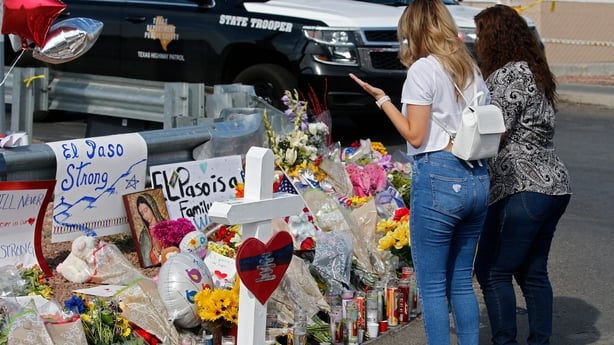
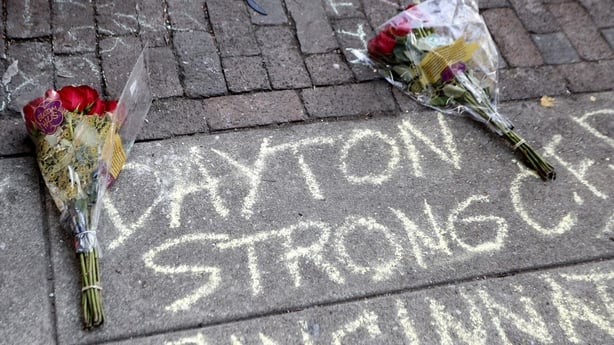
An open letter to Mr Trump in the El Paso Times described the border city as having "a deep tradition of racial harmony" whose people came together after the tragedy.
It admonished Mr Trump for calling El Paso one of the country's most dangerous cities in his February State of the Union address.
"The violence that pierced El Paso, drawing you here today, is not of our own community," wrote editor Tim Archuleta.
"An outsider came here to shatter our city, to murder our neighbours. A white man from another Texas city came to target the more than 80% of us who share Hispanic roots."
Mr Trump, in his televised White House speech on Monday, condemned "sinister ideologies" and hate.
His supporters say Democrats unfairly blame him for the behaviour of criminals.
Democrats say Mr Trump's own anti-immigrant, racially charged language at rallies and on Twitter has done much to fan racist, white nationalist sentiments, creating a political climate more conducive to hate-based violence.

